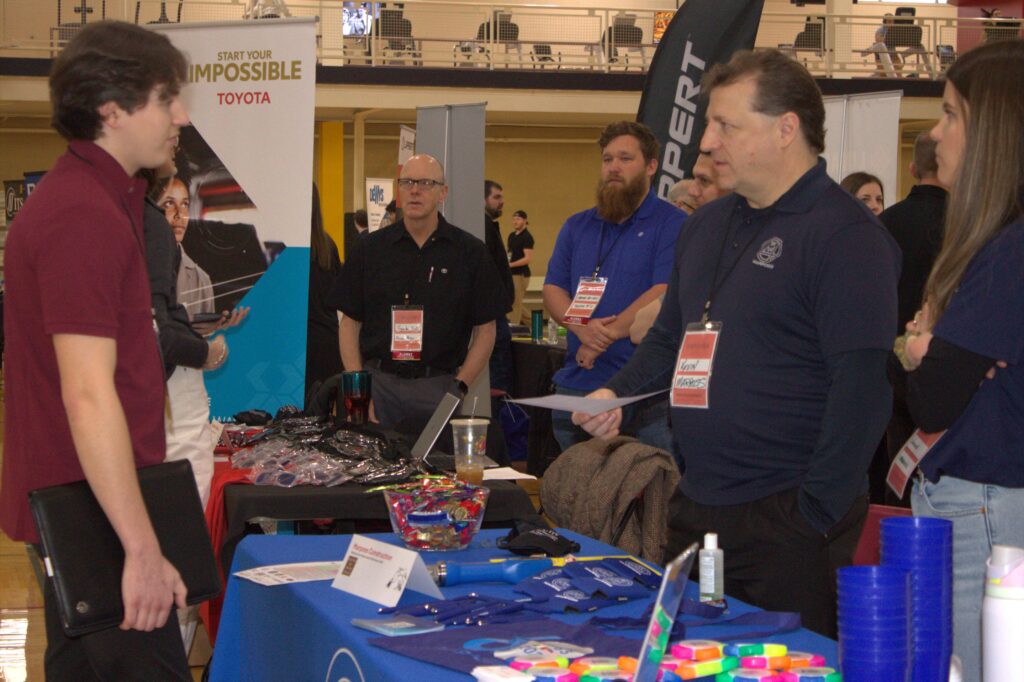Career fairs are all about seeking out job opportunities as various companies gather in one place. However, not every major is represented.
On Feb. 27 at the Student Recreational Center, a range of companies were offered to come to the Career and Internship fair. Large portions of the fair leaned more toward sciences like healthcare and criminal justice, while the afternoon leans towards humanities like education and social work.

While this is helpful for some students, other students find it difficult to find something related to their specific major.
General business sophomore Mariah Rahe mentioned her career fair experience in her freshman year before she changed her major.
“I was in radiography my freshman year but I switched it to general business, but there was like a few hospital like nursing opportunities but not really anything else that I could think of. I just kind of went to look around,” Rahe said. “I was new and I didn’t really know what I was looking for, so maybe I missed some things. I just saw that it was a lot of nursing stuff and not really into the radiography part of it all.”
At the time, Rahe was looking for something specific while searching for her career. Students come into the Career and Internship Fair with expectations that they will find what they are looking for and hope that it’s well within their major. Some students even attempt to try to find jobs or internships that are local to their area.
During the career fair, students can walk around and explore the companies and industries presented there. It presents ways for students to network and practice their skills.
Students of majors other than healthcare and education expressed their thoughts and concerns about their majors being represented at the career fair.
Architecture sophomore Travis Wilson talked about his thoughts about career fair representation.
“I mean we are kind of a smaller school, I feel like kind of far away. I know there’s not a lot of architect places really close, some like in Grand Rapids or whatever,” Wilson said. “You only got select companies that are doing it. So it’s kind of hard to find companies coming out looking for exactly what you are looking for.”
While students like Wilson have a hard time finding job opportunities at the career fair, other students find the career fair to be helpful and insightful.
Operations and supply chain management senior and president of the Operations and Supply Chain Management Association Carter Anderson expressed his thoughts about the career fair.
“I think the career fair is excellent. It’s personally helped me achieve two internships,” Anderson said. “It’s helped me a lot because it’s provided me with the opportunity to actually connect with the employers, shake their hand, and hand them a resume, which I think helped me in the application process.”
The Career and Professional Success services sends out a survey after the career fair. This survey asks whether someone went to the career fair or not and asks what companies they would like to see. With the help of student feedback, CAPS will reach out to those companies and invite them.
Whether students are looking for an internship or taking a look around, career fairs need to address and represent all student majors, including humanities.
Director of CAPS Angela Roman discussed how industries have different recruiting processes.
“Different industries and types of employers recruit differently, and so engineering technology employers typically are looking for students with a bachelor’s degree who are ready to work,” Roman said. “If you go look at some of our humanities like biology, those students are going on to master’s degrees to get into the workforce. They’re not coming to Ferris because we don’t have those master’s degrees. Our schools have to recruit a little differently.”
Roman explained how some employers who aren’t local are still getting thousands of applicants for jobs, however, because of distance, they aren’t willing to travel to an institution to recruit.
As a part of the process of setting up for the career fair, CAPS invites about 50,000 employers from inside the Handshake database as well as sending out a staff member to go out and recruit employers. All employers are invited and those who register to attend the career fair set up their own table.
“What we do for those students is they can come in and we will help teach them how those industries are recruiting so they can get internships and jobs,” Roman said. “It’s all the experiences and classes and the holistic like where you might have worked as a student that they’re looking for. So, keeping an open mind as a student job searching will help them find employers and talk to them. “
While career and internship fairs can help students, depending on what they are majoring in, the representation they may find is not always the same across the board.
